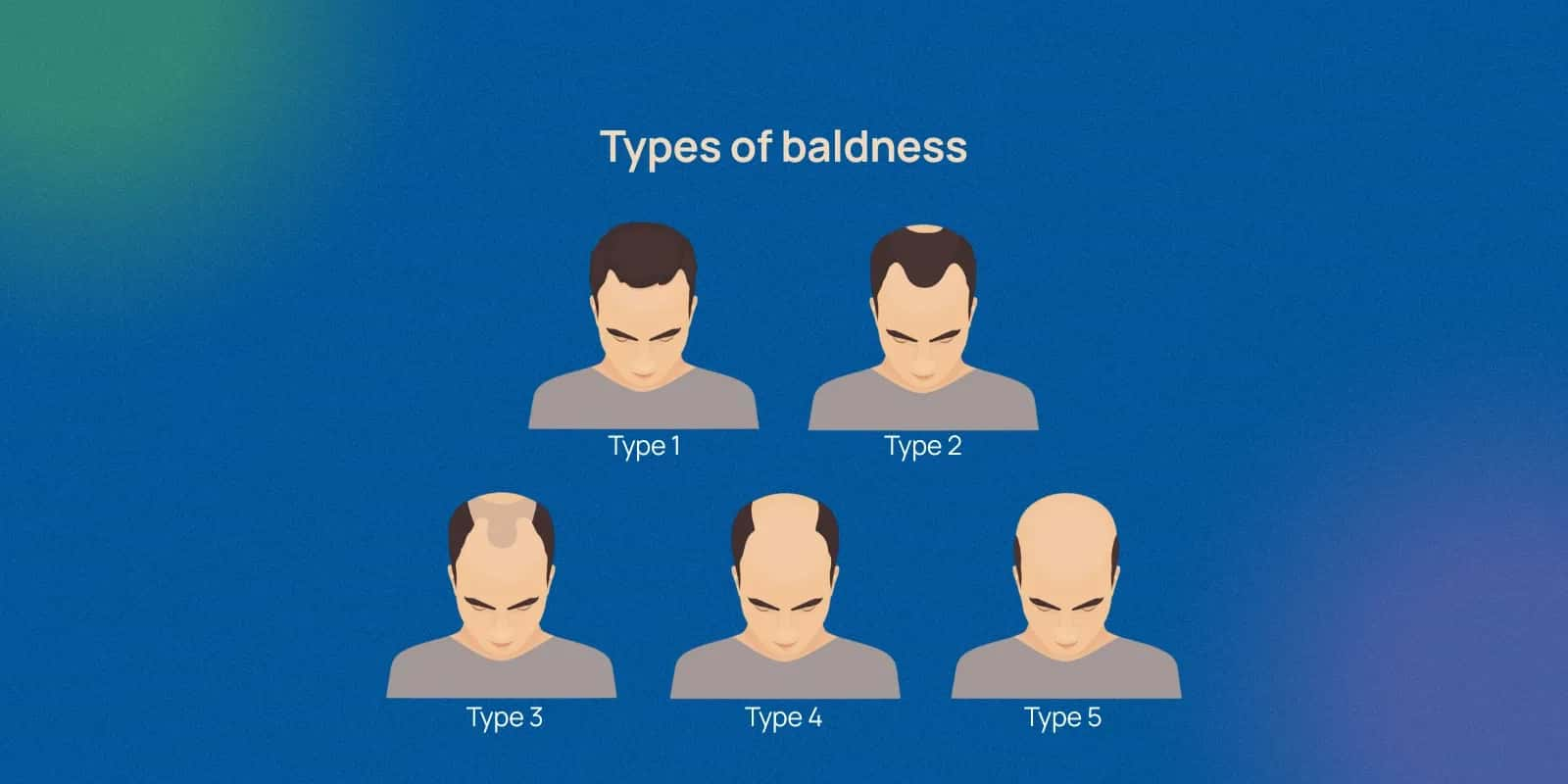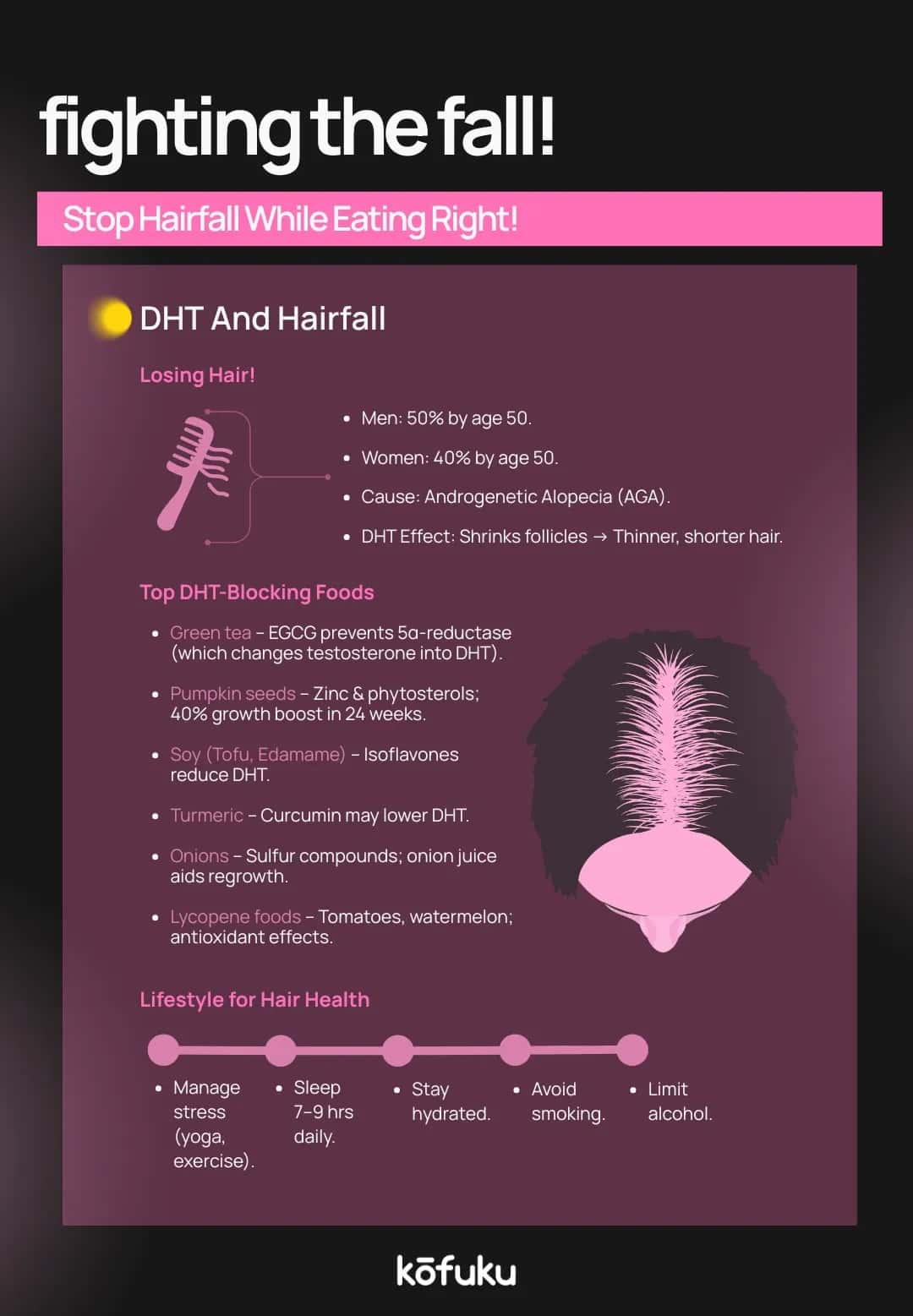6 Effective Foods That May Block DHT and Help Fight Hair Loss Naturally

Introduction
Hair loss feels heartbreaking, especially when you just casually run your fingers through your hair and a bunch of it comes out in your hands. High levels of dihydrotestosterone (DHT) are a leading cause of hair loss and thinning hair in males and females.
However, did you know that some foods commonly found in our daily diet have compounds called phytosterols that can inhibit DHT production and its activity?
This article will help you understand how consuming DHT-blocking foods, such as pumpkin seeds, green tea, and turmeric, can be an easy and low-risk way to achieve fuller, healthier hair.
What is DHT and How Does It Affect Hair Loss?
DHT is formed when testosterone is converted through the enzyme 5-alpha reductase. High levels of DHT can bind to receptors on hair follicles, causing them to shrink over time, which can lead to hair loss and thinning.
This process is called miniaturisation, and is an important process involved in pattern hair loss. If you can inhibit DHT production or enzyme activity, then you can protect your hair follicles and increase hair growth.
Essential Foods That Naturally Block DHT
As mentioned, there are some foods that have some nutrients which help inhibit DHT, some of these are listed below:
1. Pumpkin Seeds: A Natural DHT Blocker Rich in Zinc
Pumpkin seeds are high in zinc and lignans, which help inhibit the enzyme 5-alpha reductase, meaning less DHT. You can have 1-2 tablespoons daily, either raw, roasted, or blended in smoothies.
2. Green Tea and Its Powerful Catechins That Block DHT
Green tea is rich in the antioxidant epigallocatechin gallate (EGCG), which targets 5-alpha-reductase activity and protects dermal papilla cells from DHT damage. Drinking 1–2 cups daily not only supports scalp health but also helps decrease inflammation and protect your hair from damage.
3. Saw Palmetto Berries: Herbal Support for Blocking DHT
These fruits are rich in polyphenols, which help reduce enzyme activity, oxidative stress on follicles, and naturally block DHT. Research indicates that saw palmetto can help reduce hair thinning and promote regrowth in men, particularly those with androgenetic alopecia. While it's often found in supplements, adding the berries or extracts will benefit scalp and follicle health in the long run.

4. Tomatoes and Lycopene: Antioxidant-Rich DHT Blockers
These contain lycopene and other antioxidants, which help provide systemic anti-inflammatory benefits and inhibit DHT from binding to the hair follicles. Cooked or processed tomato foods, such as tomato paste and sauces, have better bioavailability of lycopene.
5. Flaxseeds and Their Omega-3 Fatty Acids to Minimise DHT Effects
Flax seeds are rich in both lignans and alpha-linolenic acid (ALA) and help balance hormones and reduce inflammation. They regulate the production of DHT, along with omega-3 fatty acids, which support follicle health. Add one tablespoon of ground flaxseeds to meals daily. You can even create a hair mask at home using it.
6. Almonds and Nuts: Biotin- and Zinc-Rich Foods That Support Hair Growth
Almonds and nuts are nutritional powerhouses and anti-inflammatory foods rich in essential fats, vitamin E, lysine, and zinc. All of these support a healthy scalp and help modulate DHT levels.

How Biotin Works with DHT Blockers for Hair Health
While biotin (vitamin B7) does not inhibit DHT directly, it does support hair growth by strengthening follicles and enhancing keratin production. When combined with DHT-blocking foods, such as green tea or pumpkin seeds, biotin improves texture, reduces breakage, and promotes hair growth. It also supports the metabolism of nutrients that nourish the scalp and hair follicles.
Common foods that contain biotin include eggs, almonds, sweet potatoes, and spinach. Combine these with DHT blockers to naturally reduce hair thinning and give your hair the nutrition it needs to be healthy.
Who Really Benefits and When to Get Professional Help
People with androgenetic alopecia, women with PCOS, or people experiencing hormonal imbalances will benefit greatly if they start including DHT-blocking foods in their daily routines.
However, results can vary from person to person, and a good diet alone cannot guarantee the elimination of hair loss. If you're still experiencing thinning after making diet and lifestyle changes, you may want to consult a dermatologist or a trichologist to discuss possible medical treatments and supplements.
Tips to Maximise the Benefits of DHT Blocker Foods for Hair Loss
-
Include daily: Eat DHT-blocking foods like flaxseeds, almonds, green tea, and pumpkin seeds on a regular basis.
-
Balance your diet: Add protein, iron, biotin, and vitamin D to support overall hair health.
-
Stay hydrated: Drink enough water to keep your scalp and hair nourished.
-
Avoid processed foods: They may increase inflammation and disrupt hormone balance.
-
Exercise regularly: Regular exercise helps manage testosterone levels and reduce excess DHT levels.
-
Reduce stress: Practice meditation, yoga, or get quality sleep, as stress and increased cortisol can worsen hair loss.
-
Be consistent: Long-term dietary habits matter more than quick fixes.
-
Use gentle hair care: Avoid harsh shampoos or heat styling that can weaken your hair.
-
Consult a professional: See a dermatologist or trichologist if there is no improvement and the hair loss persists.

FAQs
Q. What are the best DHT blocker foods for hair loss?
A. Some of the best DHT blockers include pumpkin seeds, green tea, flaxseed, turmeric, onions, and lycopene-rich fruits such as berries.
Q. How does biotin work with DHT blockers for hair health?
A. Biotin supports keratin production and can indirectly reduce the impact of DHT by strengthening hair follicles and promoting scalp health.
Q. Can pumpkin seeds block 5 alpha reductase naturally?
A. Yes, lignans and zinc in pumpkin seeds help inhibit the 5-alpha reductase enzyme, lowering DHT levels.
Q. What foods help block DHT and promote hair growth?
A. Include green tea, onions, soy, berries, flaxseeds, walnuts, avocado, tomatoes, spinach, and mushrooms, as these foods can help block DHT, promoting hair growth.
Q. How to use a DHT blocker with biotin supplements effectively?
A. Combine DHT-blocking foods with biotin and supplements for nourishing the scalp and follicles.

Best Dandruff Hair Shampoo: Causes, Treatments, and Top Anti-Dandruff Options

Eight Powerful Rosemary Essential Oil Benefits for Hair, Skin & Health

Vitamin B12 Guide: Rich Food Sources, Deficiency Symptoms, and Hair & Weight Benefits

What is Fenugreek (Methi)? Nutritional and Healing Herb for Hair and Beyond

What Is Botox for Hair? A Detailed Look at the Trend


